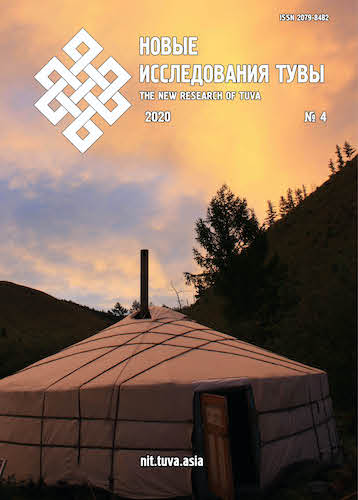Cosmos in Logos: Translingual Poetry by Eduard Mizhit and Bakhyt Kairbekov
DOI:
https://doi.org/10.25178/nit.2020.4.16Keywords:
translingualism; Russian-language literature; Tuvan poetry; Kazakh poetry; Eduard Mizhit; Bakhyt KairbekovAbstract
This article examines the issues of literary translingualism in its Russian-Tuvan and Russian-Kazakh representations. National literatures, which are sustained by the ethnogenetic “soil” of the authentic culture of an ethnic group, can be described in modern terminology as translingual, Russian-speaking and Russophonic (U. M. Bakhtikireeva). Although its external form is indeed Russophonic, the literary text keeps transmitting into the external communicative space primary cultural codes (basic concepts), which are elements of the national world picture.
The article demonstrates this, using the case of poetry by two outstanding poets of the present times — Eduard Mizhit, a Tuvan and Bakhyt Kairbekov, a Kazakh. We focus on such Russian-language poetic texts by E. Mizhit as his collections “The Voice of Silence”, “The Drops of Eternity”, “Roots”, “Facets of Loneliness”, “The Transient”, “Through Oneself”, “The Abyss”, and “Beads of Centuries”, and B. Kairbekov’s "Behind the Lattice of Words", "Mysterious Holidays", "Against the Sun", and "Parts of the Whole".
Both poets share a reflective tone which finds its expression in specific genres: ozhuk dazhy (a classic Tuvan three-liner) and tolgau (a genre of Kazakh literature combining contemplation and reflection). A special polycentric organization of space and time is also shared by both poets, as well as a pantheistic outlook, conditioned by the fusion of religious and worldview paradigms (from shamanism to Buddhism, from Tengrism to animism), is also important. A lyrical hero in both poetic universes is a lonely wanderer in a search of Truth, who takes on cultural masks of the Hunter and Nomad, of Baksa and Batyr.
References
Badikov, V.V. (2003) Stenografiya dushi [Shorthand of the soul]. In: Kairbekov, B. (2003) Dnevnik [Diary]. Almaty, Interprint. 224 p. Pp. 3 – 4. (In Russ.)
Bakhtikireeva, U. M. (2009) Tvorcheskaya bilingval'naya lichnost' (osobennosti russkogo teksta avtora tyurkskogo proiskhozhdeniya) [Creative bilingual personality: authors of Turkic origin and their texts in Russian]. Astana, CBO i MI. 259 p. (In Russ.)
Bakhtikireeva, U. M. and Shagimgereeva, B. E. (2020) Yazykovoe bytie tvorcheskoi lichnosti: Bahyt Kairbekov [Linguistic existence of a creative person: Bakhyt Kairbekov]. Sotsial'nye i gumanitarnye nauki na Dal'nem Vostoke, issue 18, no 1, pp. 83–89. (In Russ.)
Vainraikh, U. (1979) Yazykovye kontakty: Sostoyanie i problemy Issledovaniya [Languages in contact. Current state and problems of study]. Kiev, Vishcha shkola. Izd-vo pri Kiev. un-te. 263 p. (In Russ.)
Gachev, G. D. (1999) Natsional'nye obrazy mira. Evraziya — kosmos kochevnika, zemledel'tsa i gortsa [Ethnic images of the world. Eurasia as the cosmos of the nomad, farmer and mountaineer]. Moscow, Institut DI-DIK. 368 p. (In Russ.)
Dampilova, L. S. (2014) Motiv dvoinichestva v poezii Eduarda Mizhita [The motive of the doppelganger in the poetry of Eduard Mizhit]. Sibirskii filologicheskii zhurnal, no 3, pp. 158–163. (In Russ.)
Dampilova, L. S. (2015) Fenomen bilingvizma v sovremennoi poezii narodov Sibiri [The phenomenon of bilingualism in modern poetry of the peoples of Siberia]. Sibirskii filologicheskii zhurnal, no 3, pp. 196–202. (In Russ.)
Dzhuanyshbekov, N. O. (2010) Sotsial'noe znachenie integrirovannoi literatury [The social significance of integrated literature]. Russian Journal of Education and Psychology, no. 3, pp. 141–144. (In Russ.)
Dongak, U. A. (2020) Novatorstvo pisatelya-bilingva Eduarda Mizhita (tuvinskaya poeziya) [New poetic methods in the literary imagination of the bilingual writer Eduard Mizhit]. Polilingvial'nost' i transkul'turnye praktiki, vol. 17, no 4 [online] Available at: http://journals.rudn.ru/polylinguality/issue/view/1367 (access date: 15.09.20). (In Russ.) DOI: 10.22363/2618-897X-2020-17-4-
Kanagaradzha, S. (2016) Mul'tilingval'naya pedagogika neoliberal'nogo vremeni: raschistka territorii i planirovanie dvizheniya vpered [Multilingual pedagogy in the neoliberal times: clearing the territory and planning forward movement]. Sotsial'nye i gumanitarnye nauki na Dal'nem Vostoke, no. 2 (50), pp. 10–21. (In Russ.)
Karakozova, Zh. K. and Hasanov, M. Sh. (2001) Kosmos kazahskoi kul'tury [The cosmos of Kazakh culture]. Evraziya, no. 2, pp. 106–112. (In Russ.)
Kenin-Lopsan, M. B. (2006) Tyva chonnuң burungu uzhurlary [Ancient traditions of Tuvans]. Kyzyl, Tuvan book publ. 230 p. (In Tyv.)
Kosheleva A.L. (2016) Paradigma obraznogo voploshcheniya i immanentnogo sinteza kategorii “Prostranstvo”, “Vremya” i “Chelovek” v liriko-filosofskoi poeme narodnogo pisatelya Respubliki Tyva E. Mizhita “Piruety mysli” [The paradigm of figurative embodiment and immanent synthesis of the categories of “Space”, “Time” and “Man” in the lyric and philosophical poems by the national writer of the Republic of Tuva E. Mizhit “Pirouettes of thought”]. In: Filologiya i kul'turologiya: sovremennye problemy i perspektivy razvitiya [Philology and cultural studies: modern problems and prospects of development]: a collection of materials of the 20th international research and practical conference, (Makhachkala, May 15, 2016). Mahachkala, Aprobatsiya Publ. Pp. 20–24. (In Russ.)
Kremer, E. N. (2010) Problemy russko-inonatsional'nogo bilingvizma (yazykovaya i etnicheskaya identichnost' bilingval'noi lichnosti) [Problems of Russian-international bilingualism (linguistic and ethnic identity of a bilingual person)]. Diss ... Candidate of Philology. Moscow. 203 p. (In Russ.)
Campbell, J. (2017) Tysyachelikii geroi [The hero with a thousand faces]. St. Petersburg, Piter. 352 p. (In Russ.)
Lamazhaa, Ch. K. (2018) Tuvinskoe vremya i ekonomicheskaya kul'tura tuvintsev [“Tuvan time” and economic culture of Tuvans]. New Research of Tuva, no. 2, pp. 4–21. (In Russ.) DOI: https://www.doi.org/10.25178/nit.2018.2.1
Leiderman, N. L. (2005) Postrealizm: teoreticheskiy ocherk [Postrealism: a theoretical overview]. Ekaterinburg, UGPU. 244 p. (In Russ.)
Mizhit, L. S. (2007) Triada v tuvinskoi slovesnosti: poeticheskii zhanr ozhuk dazhy [The triad in Tuvan literature: the ozhuk dazhi genre of poetry]. Abstract of Diss. … Candidate of Philology. Ufa. 23 p. (In Russ.)
Mizhit, E. B. (2010) Tuvinskaya traditsionnaia kosmologiia v geroicheskom epose [Tuvan traditional cosmology in the heroic epic]. New Research of Tuva, no 1. [online] Available at: https://nit.tuva.asia/nit/article/view/570 (access date: 12.09.20.) (In Russ.)
Proshina, Z. G. (2017) Translingvizm i ego prikladnoe znachenie [Translingualism and its application]. Vestnik Rossiiskogo universi-teta druzhby narodov. Seriia: Voprosy obrazovaniia: iazyki i spetsial'nost', vol. 14, no. 2, pp. 155–170. (In Russ.)
Raevskii, D. S. (2006). Mir skifskoi kul'tury [The world of Scythian culture]. Moscow, Kniga po trebovaniyu. 600 p. (In Russ.)
Somadai, M. (2014) Shamanizm bez kavychek. Esse o tvorchestve Bakhyta Kairbekova [Shamanism without quotation marks: An essay on the work of Bakhyt Kairbekov]. In: Kairbekov, B. Navstrechu solntsu. Dnevnik puteshestvii. Stat'i, esse [Towards the sun. Travel diaries, articles and essays]. Almaty, Nurakynov. 420 p. (In Russ.)
Soyan, A. M. (2018) Obrazy-simvoly v poemakh E. Mizhita [Symbolic imagery in poems by E. Mizhit]. Mir nauki, kul'tury, obrazovaniya, no. 6 (73), pp. 563–564. (In Russ.)
Tomanova, N. M. (2012) Poeticheskaya kontseptosfera Bakhyta Kairbekova [The poetic conceptual sphere of Bakhyt Kairbekov]. In: Materialy mezhdunarodnoi nauchno-teoreticheskoi konferentsii «Aktual'nye voprosy sovremennoi filologii: teoreticheskie problemy i prikladnye aspekty», posvyashchennoi 80-letiyu akademika Bagizbaevoi Mai Mikhailovny [Proceedings of the international research conference "Urgent issues of modern philology: theoretical problems and applied aspects", dedicated to the 80th anniversary of academician Mai Mikhailovna Bagizbayeva]. Ed. by K. Abdezuly. Almaty, Қazaқ universitetі. 347 p. Pp. 182–186. (In Russ.)
Tlostanova, M. V. (2004) Zhit' nikogda, pisat' niotkuda. Postsovetskaya literatura i estetika transkul'turatsii [Live never, write from nowhere. Post-Soviet literature and aesthetics of transculturation]. Moscow, URSS. 412 p. (In Russ.)
Tlostanova, M. V. (2006) Transkul'turatsiya kak novaya epistema epokhi globalizatsii [Transculturation as a new episteme of globalization]. Vestnik RUDN. Seriya: Filosofiya, no. 2, pp. 5–16.
Tumanova, A. B. (2010) Kontaminirovannaya yazykovaya kartina mira v hudozhestvennom diskurse pisatelya-bilingva [Contaminated linguistic picture of the world in the artistic discourse of a bilingual writer]. Almaty, KBTU. 260 p. (In Russ.)
Tyupa, V. I. (2012) Modusy hudozhestvennosti [The modes of artistry]. In: Vvedenie v literaturovedenie [Introduction to literary studies]. Ed. by L. V. Chernets. Moscow, Izdatel'skii tsentr «Akademiya». 720 p. Pp. 54–69. (In Russ.)
Hugaev, I. S. (2008) Genezis i razvitie russkoyazychnoi osetinskoi literatury [Genesis and development of Russian-language Ossetian literature]. Vladikavkaz, Ir. 560 p. (In Russ.)
Bakhtikireeva, U., Valikova, O., King, J. (2017) Translingualism: Communicative Bridge or “Cultural Bomb”? RUDN Journal of Language Education and Translingual Practices, no. 14 (1), pp. 116–121.
Garcia, O. and Wei, L. (2014) Translanguaging: Language, Bilingualism and Education. New York, Palgrave Macmillan. 175 p.
Kellman, S. G. (2003) Switching languages: translingual authors reflect on their craft. Lincoln and London, University of Nebraska Press. 339 p
Kellman, S. G. (2019). Translingual Writers: Introductory Notes. Polylinguality and Transcultural Practices, no. 16 (1), pp. 9–12. DOI 10.22363/2618-897X-2019-16-1-9-12
Tannenbaum, M. and O. Haim (2007) Journeys to a New Homeland. Journal of Modern Jewish Studies, no. 6 (3), pp. 273–287. DOI: https://www.doi.org/10.1080/14725880701655037
Transcultural identities in Contemporary literature (2013) / I. G. Nordin, J. Hansen and C. Z. Llena (eds). New York, Rodopi. 320 p.
Published
How to Cite
Валикова О. А., Шагимгиреева Б. Е., Кулиева Ш. А. Космос в логосе: транслингвальная поэзия Эдуарда Мижита и Бахыта Каирбекова // Новые исследования Тувы. 2020, № 4. С. 230-249. DOI: www.doi.org/10.25178/nit.2020.4.16
For citation:
Valikova O. A., Shagimgereeva and Kulieva Sh. A. Kosmos v logose: translingval'naia poeziia Eduarda Mizhita i Bakhyta Kairbekova [Cosmos in Logos: Translingual Poetry by Eduard Mizhit and Bakhyt Kairbekov]. New Research of Tuva, 2020, no. 4, pp. 230-249. (In Russ.). DOI: www.doi.org/10.25178/nit.2020.4.16
Issue
Section

This work is licensed under a Creative Commons Attribution-NonCommercial 4.0 International License.

Author(s) license holder(s) grant rights for their work to the journal (grantee of a license) under the simple non-exclusive open license in accordance with Art. 1286.1 «Open license for a research work, work of literature or fine arts», Civil Code of the Russian Federation.
New Research of Tuva publishes articles under the Creative Commons Attribution-NonCommercial license (CC BY-NC).
Since it is an open license, author(s) reserve the right to upload the article to their institutional repository, submit it to another journal (if it allows republications), or republish it on their own website (in full, or in part).
However, several conditions apply here:
a) The republished version must always contain the name(s) and affiliation(s) of the author(s), the original title and the hyperlink to the original version on the New Research of Tuva website;
b) It must be in open access, free of charge, and no category of readers must be in any way whatsoever advantaged over general readership.
c) should the contribution be submitted elsewhere by its author(s) without substantial modification (30% or more of original text unchanged), the body of the article should contain a disclaimer that the original version was published in New Research of Tuva (with a link to the respective page)
The CC-BY-NC is a non-revocable license which applies worldwide and lasts for the duration of the work’s copyright.











